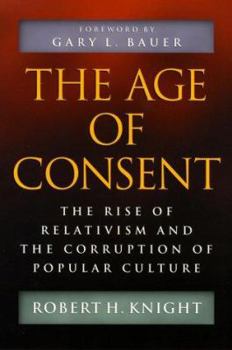The Age of Consent: The Rise of Relativism and Corruption of Popular Culture
Select Format
Select Condition 
Book Overview
The vise-grip of moral relativism on American popular culture was not suddenly achieved in the 1960s. An incisive new book of unequaled historical scope studies this alluring but poisonous... This description may be from another edition of this product.
Format:Hardcover
Language:English
ISBN:1890626058
ISBN13:9781890626051
Release Date:May 1998
Publisher:Spence Publishing Company
Length:269 Pages
Weight:1.44 lbs.
Dimensions:1.0" x 6.3" x 9.6"
Customer Reviews
3 ratings
Thoughtful and thought-provoking
Published by Thriftbooks.com User , 17 years ago
If you want a genuinely serious and reflective examination of the philosophical roots of what has been called America's "culture war," you'd be hard-pressed to find a better choice than Knight's book. Knight is a Christian and a conservative, but I am sure even a secular liberal reader could benefit from reading Knight's critique. A lot of people who rant about "the Religious Right," it seems to me, are actually angry at politicians and TV preachers (or perhaps are motivated by some personal resentment of authority, or by a grievance against religion) and thus do not consider the deeper moral questions that Knight explores in "The Age of Consent." This book is eminently readable, told in a calm, sure and clear narrative style (Knight is a former L.A. newspaper editor). The reader is free to disagree with Knight's analysis, or with the answers he proposes to the problems he diagnoses, but this is a book that should not be merely ignored.
Familiar territory, but better than most.
Published by Thriftbooks.com User , 19 years ago
The Bible verse that opens the preface sums it up nicely: "And they all with one consent began to make excuse." (Luke 14:18) The age of consent, in the way that Knight uses it here, refers to an era in which absolute authority (or even the attempt to appeal to absolute authority) has been drowned out in a flood of changes to the modern cultural pillars (largely the entertainment and cultural fields) that have rendered equal every lifestyle, no matter how destructive or self-absorbed it becomes. In anticipation of the counterargument that suggests that if another person does what he or she wants, it's nobody's business but their own, Knight lays out the landscape of what the cultural fields look like as compared to just a few decades ago. The institutions that have buttressed society and made them better -- the family, religion, and sound education -- have become the targets of the relatively recent cultural barrage. In this sense, Knight argues, it affects everybody, especially the generations that grow up with this environment being the norm. Although there are separate chapters on each of the two subjects, Knight is concerned about more than just the exaltation of sex and the denigration of God in the culture. The linchpin of his argument is that by dismantling the mechanisms to discern good from bad -- in other words, by making all things equal -- it only festers a further breeding ground for the more base desires to be promoted underneath a glossy veneer of "tolerance" and so-called progressive enlightenment. One of the ways to distinguish between these types of books is, now that they have described the problem, what is to be done about it? The final chapter of the book points to positive trends in the hope that it provides a transition into an overall improvement, which Knight details in several bullet points to express how the cultural change will have not only moral improvements, but also fiscal improvements as there will be fewer personal messes for the government to clean up. Even though it came out several years ago, most of the book is not confined to that timeframe. Most of it is still relevant today.
An angry protest against cultural decay, with hopeful ending
Published by Thriftbooks.com User , 26 years ago
Bob Knight is angry with an America that has taken the wrong path, and he takes the cultural leaders to task for leading the country astray since the 1960s. High culture, low culture, and middlebrow are all misguided, according to this book, and only a return to American traditions will rescue American civilization from decay. In his final chapter he finds hope in grass-roots America, which Knight argues can revitalize the country's intellectual and cultural life, if given a chance. Written from a Christian perspective, it presents an important point of view which should be seriously considered by all Americans interested in cultural developments.






